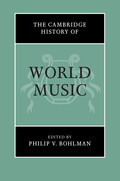Description
The Cambridge History of World Music
The Cambridge History of Music Series
Coordinator: Bohlman Philip V.
The first comprehensive history of music on a global basis, laying the foundations for a sweeping history of all music.
Language: English
The Cambridge History of World Music
Publication date: 12-2013
875 p. · 16x23.4 cm · Hardback
Publication date: 12-2013
875 p. · 16x23.4 cm · Hardback
The Cambridge History of World Music
Publication date: 07-2017
Support: Print on demand
Publication date: 07-2017
Support: Print on demand
Description
/li>Contents
/li>Biography
/li>
Scholars have long known that world music was not merely the globalized product of modern media, but rather that it connected religions, cultures, languages and nations throughout world history. The chapters in this History take readers to foundational historical moments ? in Europe, Oceania, China, India, the Muslim world, North and South America ? in search of the connections provided by a truly world music. Historically, world music emerged from ritual and religion, labor and life-cycles, which occupy chapters on Native American musicians, religious practices in India and Indonesia, and nationalism in Argentina and Portugal. The contributors critically examine music in cultural encounter and conflict, and as the critical core of scientific theories from the Arabic Middle Ages through the Enlightenment to postmodernism. Overall, the book contains the histories of the music of diverse cultures, which increasingly become the folk, popular and classical music of our own era.
Introduction: world music's histories Philip V. Bohlman; Part I. Histories of World Music: 1. On world music as a concept in the history of music scholarship Bruno Nettl; 2. Music cultures of mechanical reproduction Peter Manuel; 3. Western music as world music Nicholas Cook; Part II. The History of Music before History: 4. Foundations of musical knowledge in the Muslim world Stephen Blum; 5. Indian music history in the context of global encounters Bonnie C. Wade; 6. Native American ways of (music) history Beverley Diamond; Part III. Music Histories of Global Encounter and Exchange: 7. Encounter music in Oceania: cross-cultural musical exchange in eighteenth- and early nineteenth-century voyage accounts Vanessa Agnew; 8. Music, history, and the sacred in South Asia Jaime Jones; 9. Music, minas, and the golden Atlantic Suzel A. Reily; Part IV. The Enlightenment and World Music's Historical Turn: 10. Johann Gottfried Herder and the global moment of world-music history Philip V. Bohlman; 11. Tartini the Indian: perspectives on world music in the Enlightenment Sebastian Klotz; 12. The music of non-western nations and the evolution of British ethnomusicology Bennett Zon; Part V. Music Histories of the Folk and the Nation: 13. Korean music before and after the West Keith Howard; 14. Folk music in Eastern Europe Timothy J. Cooley; 15. A story with(out) gauchos: folk music in the building of the Argentine nation Bernardo Illari; Part VI. Asian Music Histories: 16. Four recurring themes in histories of Chinese music Jonathan P. J. Stock; 17. On the history of the musical arts in South East Asia Margaret Kartomi; 18. Musicians and the politics of dignity in South India Kaley Mason; Part VII. Institutions and Politics of Representation: 19. Images of sound: Erich M. von Hornbostel and the Berlin phonogram archive Lars-Christian Koch; 20. Music in the mirror of multiple nationalisms: sound archives and ideology in Israel and Palestine Ruth F. Davis; 21. Repatriation as reanimation through reciprocity Aaron A. Fox; Part VIII. The Globalization of World Music in History: 22. Landscapes of diaspora Timothy Rommen; 23. Sufism and the globalization of sacred music Regula Burckhardt Qureshi; 24. Global exoticism and modernity W. Anthony Sheppard; Part IX. Musical Discourses of Modernity: 25. Encountering African music in history and modernity Gregory Barz; 26. The politics of music categorization in Portugal Salwa El-Shawan Castelo-Branco; 27. The world according to the Roma Michael Beckerman; Part X. Musical Ontologies of Globalization: 28. Disseminating world music Travis A. Jackson; 29. Musical antinomies of race and empire Wayne Marshall and Ronald Radano; 30. Globalized new capitalism and the commodification of taste Timothy D. Taylor; Part XI. Beyond World-Music History: 31. The time of music and the time of history Martin Clayton; 32. The ethics of ethnomusicology in a cosmopolitan age Kay Kaufman Shelemay; 33. Towards a new world? The vicissitudes of American popular music Richard Middleton; Afterword: a worldly musicology? Martin Stokes.
Philip V. Bohlman is the Mary Werkman Distinguished Service Professor of Music and the Humanities at the University of Chicago and Honorarprofessor at the Hochschule für Musik, Theater und Medien Hannover. A pianist, he is the Artistic Director of the New Budapest Orpheum Society, a Jewish cabaret and ensemble-in-residence at the University of Chicago. Among his honors are the Edward Dent Medal, the Berlin Prize, the Derek Allen Prize from the British Academy and the Noah Greenberg Award from the American Musicological Society. He is currently completing the volume, Ethnomusicology, for the Cambridge Introductions to Music series.
© 2024 LAVOISIER S.A.S.





